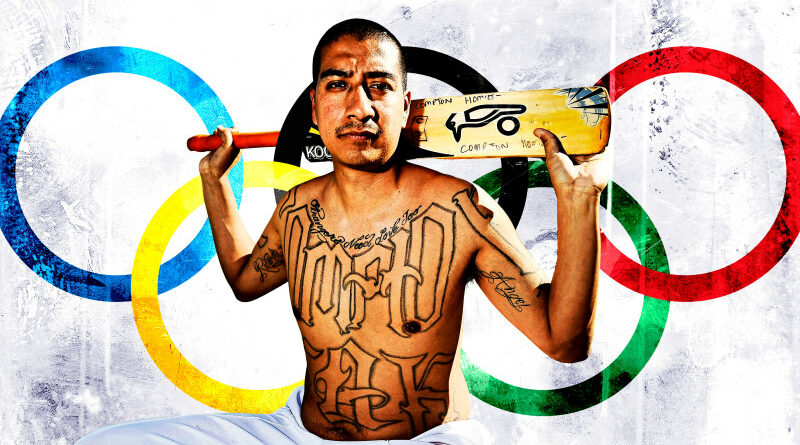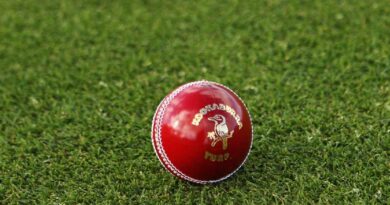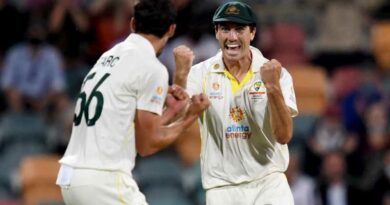US cricket, a history: George Washington, gangbangers and Olympic gold
By Dan Walsh
Ricardo Salgado of the Compton Cricket Club.Credit: Stephen Kiprillis/Getty
Save articles for later
Add articles to your saved list and come back to them any time.
“I know I never would have walked into Buckingham Palace, into the private residence of Prince Edward and had tea with him. But it took a bunch of gangbangers from Compton to get me there.”
Cricket didn’t start in the USA with now-79-year-old film producer Katy Haber, prominent activist Ted Hayes, and the famed Compton Cricket Club.
Getting the band back together: Ted Hayes (foreground) and the original Compton Cricket Club in 2007.Credit: Jeff Rayner
Anecdotal evidence suggests George Washington played a game or two, the USA versus Canada contest of 1844 was cricket’s first ever international contest and it wasn’t until the Civil War (1861-65) that baseball became America’s dominant summer pastime.
Almost 180 years later, hundreds of millions of dollars are now flowing into the American arm of the game, fuelled by subcontinental TV interest and spawning an Olympics return at the 2028 Los Angeles Games.
Aaron Finch captains the San Francisco Unicorns in Major League Cricket – the new six-team Twenty20 competition where four sides are effectively owned by Indian Premier League franchises.
Unicorns coach Shane Watson is regularly stopped for selfies and autographs in Silicon Valley. The highest-paid stars earn around $250,000 for three weeks playing time, while investors and team owners have found fame and fortune in Bollywood, Facebook and Microsoft.
Marvelling at it all, with stories to rival any of the above, are Haber and the Compton Cricket Club – a band of cricketing misfits drawn first from a Los Angeles homeless shelter, and then the streets of Compton to tour the world.
It was Haber who first introduced Hayes – a civil rights and homeless activist – to cricket with an offer to play under the Hollywood sign for a Beverley Hills team in the mid-1990s.
Original Compton Cricket Club tourist Sergeo Pinales at Bondi Beach in 2011.Credit: Andrew Goldie
Hayes went from “what’s cricket?” to an immediate love for the sport, founding first the LA Krickets – comprised of homeless players from a local shelter – then the Compton Cricket Club that toured England, Ireland and Australia over the next two decades.
“The ‘Homies and the Popz’,” Haber laughs of Compton Cricket’s self-appointed moniker.
“The first all-American touring team. All those boys, they were 14 or 15 when we started it all, from the streets of Compton.
“Some we lost to drive-by shootings and car accidents, they came from such hard backgrounds and went to such incredible places.
“The guys have all grown up, they’ve all got their own families and careers now. Ted is endeavouring to create another team but I’m too old to be picking them up for practice and driving them around. I was dropping them off at court more than I would have liked back in those days too.
“My big aim now is to make the Compton Cricket Club movie, it’s just such a good story, it’s the Cool Runnings of cricket.”
Straight outta Compton: Isaac Hayes, Sergeo Pinales, Ted Hayes and Theo Hayes on tour in 2011.Credit: Andrew Goldie
Haber has the chops with a production CV headlined by sci-fi classic Blade Runner and plenty to work with – be it the team’s meetings with English royalty, playing alongside Brian Lara or Denis Compton’s gratitude “for naming your cricket club after me”, a misunderstanding immortalised in a shirt autographed by one of England’s greatest ever batsmen.
In the same vein, cricket has long seen plenty to work with Stateside. There is obvious money to be made in broadcast and content deals, expat diasporas, enthusiasm and curiosity to capitalise on.
Plenty have failed to make a mark too over the years, from disgraced fraudster Allen Stanford’s Caribbean incursions that took in Florida, to exhibition matches and fledgling, quick-to-fail competitions with buy-in from Shane Warne, Sachin Tendulkar, Desmond Haynes and Clive Lloyd in one form or another.
Petty administrative squabbles at domestic level have abounded. But with next year’s T20 World Cup being staged in the West Indies, Texas, Florida and New York, and the 2028 Olympics on the way, a corner has seemingly been turned.
Especially with Major League Cricket – estimated to have cost around $180 million in start-up costs – requiring franchises in Los Angeles, San Francisco, Dallas, New York, Seattle and Washington to boast elite-level cricket stadiums by the 2025 tournament.
“Our expectations were that it could have been anything from an unmitigated disaster to a really successful tournament,” Cricket Victoria CEO Nick Cummins says after the organisation’s partnership with San Francisco.
Sachin Tendulkar and Shane Warne championed a series of all-star exhibition games in New York, Houston and Los Angeles in 2015.Credit: AP
“And everything exceeded our expectations … The expansion model is more or less targeting another two teams in five years and another two at the 10-year mark. So in a decade, with the facility requirements, you could see 10 cricket venues in 10 of the biggest cities across the USA.”
With a roll call of T20 stars ranging from Marcus Stoinis and Finch to Jason Roy, Kieran Pollard and Andre Russell, two-thirds of games at Dallas’s Grand Prairie Stadium were claimed to have sold out the 7000-capacity venue.
“I think Major League Cricket has the potential to be among the top three or four [T20] leagues in the world within three to four years,” Cricket NSW’s Michael Klinger says, having spent 10 weeks Stateside courtesy of the Blues’ partnership with Washington.
Klinger pegs the standard of America’s best local players around the top of Premier Cricket in Victoria and NSW, noting the IPL and Indian first-class links of many. Cricket USA estimates more than 200,000 players participate in various forms of the game.
“And 80-90 per cent of crowds would have had south-Asian backgrounds,” Klinger says.
“So it probably felt more like an IPL game than NFL,” Cummins agrees. “But I think there were two sides to it.
The next generation: Scenes from the Texas Cricket Academy in April.Credit: Christopher Lee
“The Americans from non-cricket backgrounds coming to see what cricket is, and also for example, I met an Indian father in the stands with his arms out wide saying to his American-born kids ‘this is cricket’.
“In the [San Francisco] Bay area alone, there’s something like 500,000 people of Indian background, that’s the size of Tasmania. So the critical mass is there.”
So too are those Los Angeles Games, and cricket’s first foray at the Olympics since 1900.
If Haber and Hayes have their way, the Compton Cricket Club will be flying the flag in 2028 too.
“I’ve already got Prince Edward’s endorsement, but I want to try and get in touch with King Charles,” Hayes told The US Sun recently of his bid for grassroots funding for cricket in LA.
“I’m working on it.”
“So Ted’s handling that,” Haber says. “I’ll work on the movie and that side of things. How can you tell a story about American cricket without the Homies after all?”
Sports news, results and expert commentary. Sign up for our Sport newsletter.
Most Viewed in Sport
Source: Read Full Article









